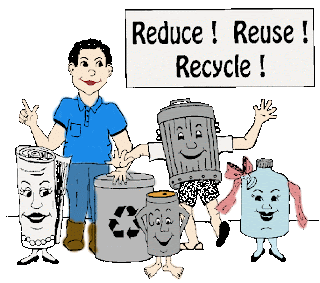By Frank Carini, ecoRI.org
We need to cut down on the amount of stuff we recycle. Recycling has its merits, don’t get me wrong, but it’s a little passé. It’s not the cool thing to do anymore. Of course, it still beats burying what we don’t want in landfills or burning it in incinerators.
But there are hipper ways to lessen the clutter. We should start by reducing the amount of crap we make, buy and use.
Do we need to drink from Styrofoam cups or ship boxes packed with Styrofoam “peanuts”? Styrofoam discarded today will hang around for close to 500 years. Why do we continue to make it and use it? What are we trying to protect with all those polluting peanuts?
The
United States
If
for some unique reason you need one of these resource-wasting products, at
least reuse it.
Reuse
shouldn’t be confused with recycling. Reuse means any activity that lengthens
the life of an item. Recycling is the reprocessing of an item into a raw
material for use in a new product. Reuse is nothing new; we’ve just forgotten
how to do it.
Reuse
is accomplished by purchasing durable goods, buying and selling in the used
marketplace — Freecycle and Craigslist,
for example — and attending to maintenance and repair. It means developing
products that are capable of being remanufactured. It means not buying
disposable crap.
Reuse
confronts the challenges of waste reduction and ever-shrinking landfill space.
It can support a productive economy. It reduces the strain on valuable
resources, such as fuel, forests and water supplies, and helps protect wildlife
habitats. It creates less air and water pollution than making a new item or
recycling another.
Look
at it this way. Take the old desktop computer you want to make disappear. If
you allow it to be reused, another person, who needs a computer but can’t
afford it, gets access to one. Give it to Free
Geek Providence, which donates reused computers to those who lack
the resources to obtain such technology.
If
you opt to recycle it, you drop it off at a recycling center, most likely the
Central Landfill in Johnston
In
fact, the manufacturing of new plastic from recycled plastic requires
two-thirds of the energy used in virgin plastic manufacturing, and recycled
plastic often isn’t used for the same products over and over again.
Basically,
recycling involves the use of additional energy and the outlay of additional
expenses to convert old items into new ones. It’s an industrial process that
collects used materials, and melts, smashes, shreds or otherwise transforms
them into raw materials.
Recycling
isn’t an environmentally benign practice. Recycling institutionalizes
disposables — think plastic bags — and single-use items — think juice boxes —
by treating them after they have been created. Recycling helps guarantee
unnecessary items will continue to be manufactured.
When
something is reused, there is no additional strain on the planet’s finite
resources. No old-growth forests are clear-cut, no new wells are drilled in the
Gulf of Mexico , no rivers are dammed up and
there are no fleets of fossil-fuel-chugging trucks duplicating the routes
already driven by garbage trucks to take recyclables to facilities that burn
energy and emit pollution.
The
practice of reusing doesn’t get lost in the politics of industry-supported
“environmentalism,” and it preempts consumption.
Obviously,
recycling is less wasteful than burying and burning what we no loner want, but
the recycling wave helped turn us into rampant consumers. It helped create a
throwaway society, as if recycling somehow justifies buying a case of
petroleum-based plastic bottles filled with tap water and carrying it out of
the store in a plastic bag.
Every
60 minutes in the United
States
In
fact, the world’s most abused and wasted natural resource is water. We could
better reuse it if we collected it in rain barrels, instead of letting it get
washed away across asphalt, concrete and other impervious surfaces.
Recycling
is important, but we can’t recycle our way out of disposability. It’s not absolution
for our consumptive sins. Reduce and reuse are much more effective in reducing
our waste stream.
Frank
Carini is the executive director of ecoRI News.

